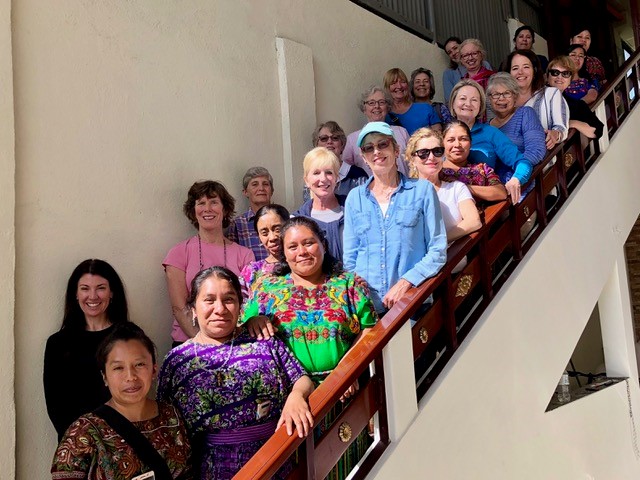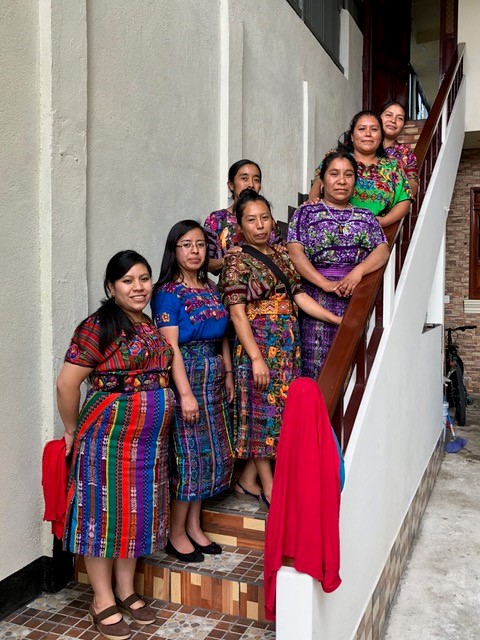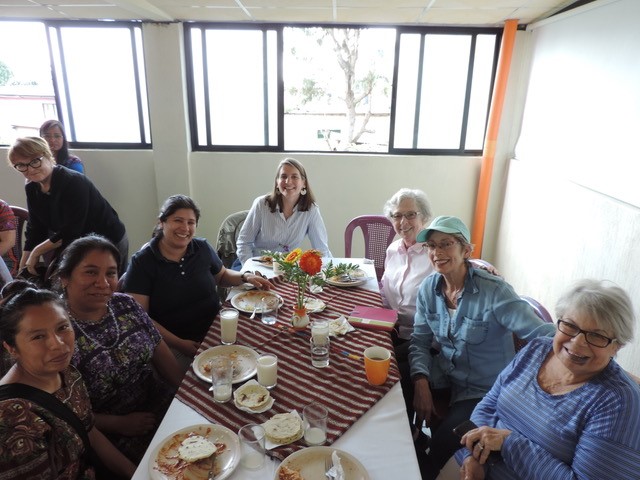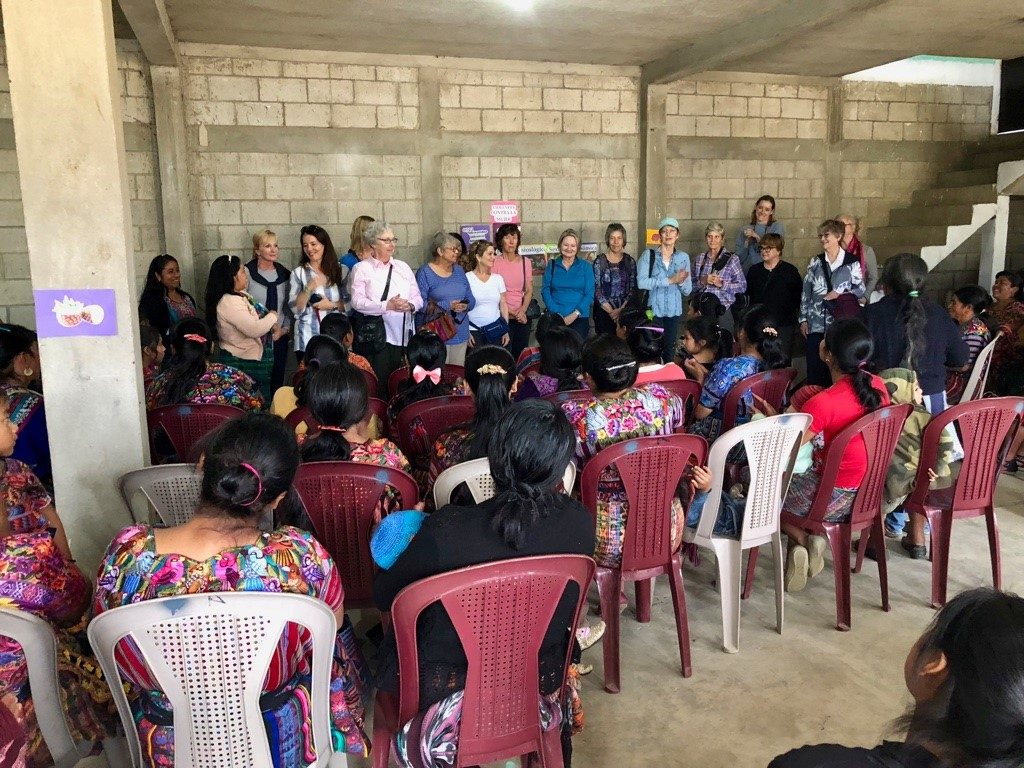
Guatemala 2018 — Day 6 – Women’s Justice Initiative
By Suzanne Spitzer, Dining for Women member, SC, Greenville-7 chapter
Background
Guatemala faces some of the highest levels of violence against women and girls in the world, has the third highest femicide rate globally, and ranks third lowest in the region on the Gender Inequality Index. Rural indigenous women and girls are disproportionately impacted due in part to their social isolation and limited access to resources.
Women’s Justice Initiative
Kate Flatley, a Yale and University of Virginia law graduate, founded Women’s Justice Initiative (WJI) in 2011 to improve the lives of indigenous Guatemalan women and girls.
WJI’s systemic change model focuses on the following initiatives: Women’s Rights Program, Adolescent Girls Program, Community Advocates Program, Legal Services Program, and Engaging Community Actors Program (government officials and community leaders).
Dining for Women (DFW) provided WJI with a $45,000 grant to help fund staff salaries, training materials, workshops, legal services, office costs, meals, and transportation. It felt extremely gratifying to learn and see firsthand the work WJI is doing and our grant money in action.
*************
Today we traveled from our hotel, Dos Mundos in Panajachel, to the WJI’s office in Patzun, Chimaltenango. Patzun is in the western highlands of Guatemala where 95 percent of the population identifies as Kaqchikel Maya. We had a two-hour drive through small villages and past fields of tall corn. We even got a good sighting of active volcano Fuego puffing smoke into the sky!
On arrival, we were greeted by Kate Flatley, Executive Director, and Robin Schmid, Development and Communications Coordinator. Our day was planned as follows:
- A general presentation by Kate about WJI’s work and impact
- A group question and answer conversation with four Community Advocates
- Lunch
- A visit to see a community workshop on violence against women
We gathered in the community room over coffee and cookies. Kate provided us with a general presentation about the mission, directives, and the remarkable growth of WJI’s outreach. Notably:
| October 2011 (pilot) | October 2018 |
|---|---|
| 1 program | 4 programs |
| 1 community | 28 communities |
| 14 direct beneficiaries | + 10,000 direct beneficiaries |
| 2 staff members | 11 staff members |
| 31 Community Advocates | |
| 22 Community Action Plans | |
| + 1,000 legal cases |
Clearly WJI is making an impact with their work, and with their donor and grantee programs. Now, with a three-year grant from the United Nations Trust Fund to End Violence Against Women, WJI’s ability to expand its services geographically will be sustained.
The second part of our meeting was focused on the work of the Community Advocates. We were joined by eight others including four Community Advocates. The Legal Services Program Coordinator facilitated the discussion with the Advocates, and Robin Schmid translated the questions and answers from Kaqchikel to English, and for our questions English to Kaqchikel.

Community Advocates and Supporting Staff
Advocates are the face of WJI in the local communities. Women selected to be Advocates must complete a two-year training program that combines human rights education with leadership development. Advocates help facilitate six-month long (weekly) workshops in their communities in which they teach local women about domestic violence, sexual and reproductive rights, and property rights. They also engage with community leaders to get assistance and to develop community action plans, and provide the opportunity for women to get legal support from WJI.
It was truly a moving exchange as we learned about the challenges these Advocates face in their communities, and we also learned about the successes in helping victimized women. Some of these Advocates are married and some are single. Most have experienced abuse themselves. One Advocate expressed her hope that “there would no longer be violence in her community, greater gender equality, and girls don’t marry at a young age.”
Following the educational morning programs, we were served lunch and then went by bus to the community of El Sitio. Here we observed a workshop run by Estela, a Program Facilitator, with the support of two Community Advocates from this community. Program Facilitators are actual WJI staff members who are skilled workshop trainers and educators. The Community Advocates are not staff members but they do receive a stipend for their work.
Usually about 25 women attend but today it was a larger group with graduates from previous workshops attending. We stood at the back to watch the teaching, which focused on violence against women and that such behavior is NOT acceptable. The concepts of physical, psychological, sexual, and economic abuse were discussed. The teaching and discussion is in the local dialect Kaqchikel, but written words on posters and materials are in Spanish as Kaqchikel is an oral tradition.

Robin Schmid, Karen (our tour guide), Eleanor, Suzanne, Linda and two Community Advocates
The myth that was addressed was: Myth I. Solo se produce violencia determinades familias. Violence only manifests itself in certain families that deserve it. WJI is teaching the women that domestic violence can occur in any family regardless of their economic, cultural or social levels, and that it is never acceptable, deserved, or predetermined.
A game was played with a person beating a drum as a ball is passed. When the drum stops, the person holding the ball must address one of the questions stuck on the ball. The questions ask for examples of these abuses. The group, I understand, was a little shy today as we are there, and so the ball was passed very quickly with lots of giggling!!
Other myths this community will learn are: Violence within the family is exclusively a private matter. Another, when a woman is hit, it is because she deserves it. And, if a women has children it is better to put up with violence. In demystifying these myths, WJI is clearly striving to change longstanding cultural norms.
 We were honored to be asked to come forward before the group, and the women applauded us. One woman stood and, in Kaqchikel, sincerely and movingly thanked us for our DFW donation, with Kate translating. It was a very touching moment for us all, and I left feeling grateful and proud to be part of DFW.
We were honored to be asked to come forward before the group, and the women applauded us. One woman stood and, in Kaqchikel, sincerely and movingly thanked us for our DFW donation, with Kate translating. It was a very touching moment for us all, and I left feeling grateful and proud to be part of DFW.
Before leaving WJI, we were most excited to learn that WJI is implementing a pilot to bring technology to the workshops and communities. One area being addressed is the use of technology to connect women requiring legal aide to WJI’s legal services — a more effective strategy than legal staff having to travel to attend these meetings or meet with families. It will be interesting to learn about the impact of this pilot.
Words can only convey so much, but the experience of this day will live on within each of us. I, for one, feel changed by this day. I am in awe of WJI’s work and can appreciate the systemic work this group is doing to change the culture and lives of women and girls in this area. They have a wonderful model that has been effectively developed and can be rolled out to even more rural areas. I hope WJI will achieve their goals … a new Guatemala where women are active leaders in their communities; have access to legal services; have knowledge of their legal rights and can safely assert these rights; and are free from violence against women and girls.
With gratitude to Kate, Robin, staff, and Advocates for sharing their day so we could learn of their wonderful work.
